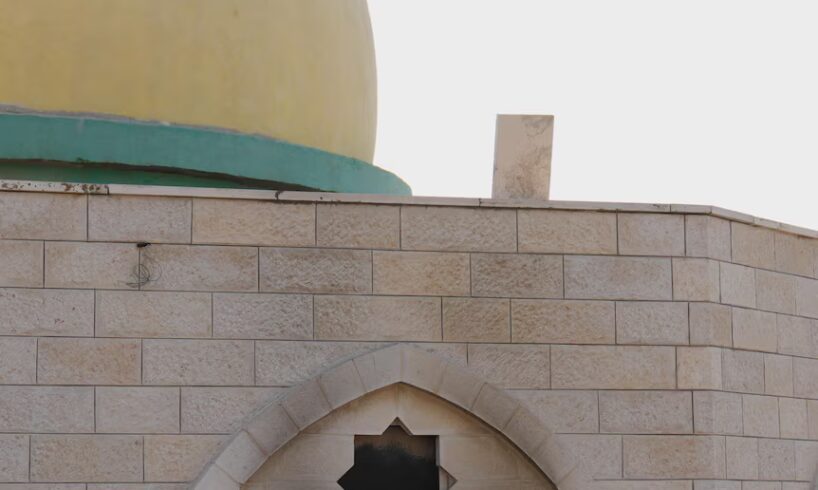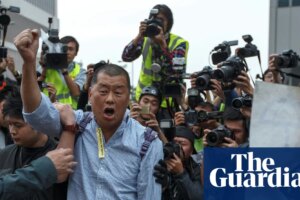
Israeli settlers have torched and defaced a mosque in a Palestinian village in the central West Bank, scribbling hateful messages in a show of defiance after some Israeli leaders condemned a previous attack against Palestinians.
One wall and at least three copies of the Quran and some of the carpeting at the mosque in the Palestinian town of Deir Istiya had been torched when an Associated Press reporter visited Thursday.
On one side of the mosque, settlers had left graffitied messages like “we are not afraid,” “we will revenge again,” and “keep on condemning.”
The writing scrawled in Hebrew was difficult to make out. It appeared to reference Major General Avi Bluth, the chief of the military’s Central Command, who issued a rare denunciation of the violence on Wednesday.
The Israeli military said in a statement that it had sent troops to investigate the scene and had not identified any suspects.
It said that it was transferring the case to the Israeli police and security agency.
The attack came after condemnation of a previous settler attack earlier in the week which saw four Israelis arrested. (AP: Nasser Nasser)
The torching and defacing of the mosque was the latest in a string of attacks that have provoked expressions of concern from top officials, military leaders and the Trump administration.
Speaking at a news conference on Wednesday, US Secretary of State Marco Rubio said that there was “some concern about events in the West Bank spilling over and creating an effect that could undermine what we’re doing in Gaza”.
Israeli officials have sought to cast settler violence as the work of a few extremists.
But Palestinians and rights groups say that the violence is widespread and carried out by settlers across the territory, with impunity from Israel’s right-wing government, led by Israeli Prime Minister Benjamin Netanyahu.
Mr Netanyahu is yet to comment on the surge in violence.
The mosque has been attacked previously, and comes amid an intensifying trend of violence in the Palestinian territory. (AP: Nasser Nasser)
Rare condemnation
The round of recent denunciations were in reaction to a particularly brazen attack on Tuesday that saw dozens of masked Israeli settlers set fire to vehicles and other property in the Palestinian villages of Beit Lid and Deir Sharaf.
The army said that the settlers then fled to a nearby industrial zone and attacked soldiers responding to the violence, damaging a military vehicle.
Four Israelis were arrested, and four Palestinians were wounded, authorities said.
Another conflict is flaring between Israelis and Palestinians
Israeli President Isaac Herzog described the attacks as “shocking and serious.”
Mr Herzog’s position, while largely ceremonial, is meant to serve as a moral compass and unifying force for the country.
Herzog said that the violence committed by a “handful” of perpetrators “crosses a red line,” adding in a social media post that “all state authorities must act decisively to eradicate the phenomenon.”
The Israeli army’s chief of staff, Lieutenant General Eyal Zamir, echoed Mr Herzog’s condemnations of the West Bank violence, saying that the military “will not tolerate the phenomena of a minority of criminals who tarnish a law-abiding public.”
He said that the army is committed to stopping violent acts committed by settlers, which he described as contrary to Israeli values and that “divert the attention of our forces from fulfilling their mission.”
On Wednesday, police said that three of the suspects were released.
Palestinians accuse the government of Israeli Prime Minister Benjamin Netanyahu of turning a blind eye to increasing violence from Israeli settlers. (Reuters: Jonathan Ernst)
The fourth suspect, a minor arrested on suspicion of arson and assault, will remain in custody for six more days, as ordered by a judge.
Police said that the actions of the three who were released are still under investigation “with the goal of bringing offenders to justice, regardless of their background.”
Decades of violence
Settler violence has been steadily mounting for decades, and the mosque in Deir Istiya had previously come under attack by settlers.
Settlers vandalised the mosque in 2012, according to the US State Department, and again in 2014, according to a round-up of settler violence from the website of the Anti-Defamation League.
The violence had reached peak highs before the war in Gaza erupted more than two years ago, and has only worsened since then.
October was the month with the highest-ever number of recorded settler attacks in the West Bank since the United Nations Office for the Coordination of Humanitarian Affairs, known as OCHA, began keeping track in 2006.
Palestinians say the goal of the violence is to push them off their lands.
OCHA said that 3,535 Palestinians have been displaced by settler violence or access restrictions since 2023, a major upswing from previous years.
Settlement expansion
Emboldened by Mr Netanyahu’s right-wing government, settlers have expanded beyond the bounds of pre-existing settlements to establish new farming outposts, which they call “young settlements.”
The outposts — usually little more than a few sheds and a pen for livestock — now spill down settlement hilltops toward Palestinian villages, with some settlers gaining control of the villages’s agricultural land and water sources.
Palestinians and human rights workers accuse the Israeli army and police of failing to halt attacks by settlers.
Israel’s government is dominated by far-right proponents of the settler movement including Finance Minister Bezalel Smotrich, who formulates settlement policy, and Cabinet minister Itamar Ben-Gvir, who oversees the nation’s police force.
About 94 per cent of all investigation files opened by the Israeli Police into settler violence from 2005 to 2024 ended without indictment, according to monitoring by Israeli human rights group Yesh Din.
Since 2005, just 3 per cent of the investigation files opened into settler violence led to full or partial convictions.
AP





